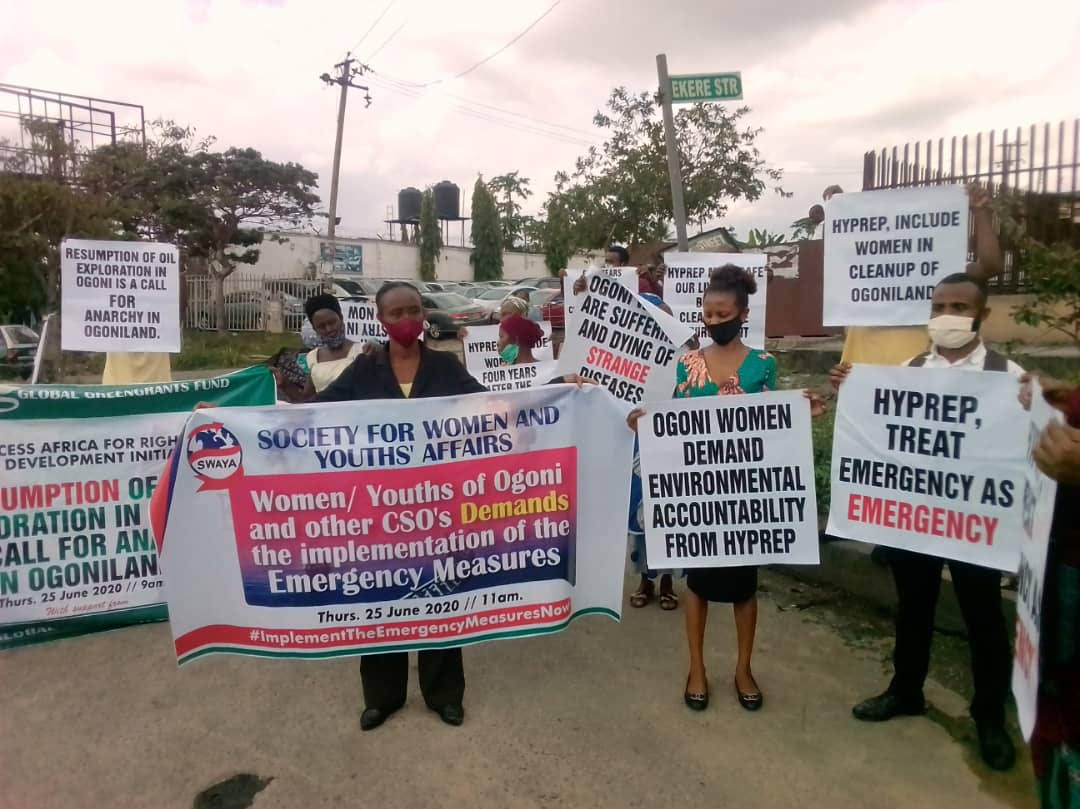Blessing Iruoma, Port Harcourt
Ogoni women, on Thursday, urged the management of Hydrocarbon Pollution Remediation Project (HYPREP), to develop a gender policy that meets international best practices for the implementation of its cleanup activities in Ogoniland.
The women from communities in Ogoni including Eleme, Bodo, K-dere, Tai, Zakpor and assembled themselves under the aegis of Society for Women and Youth Affairs, made the demand during their peaceful protest to the HYPREP head office on Aba Road in Port Harcourt, Rivers State.
According to the aggrieved women who said they are most affected in the oil spill which has devastated their source of livelihood, lamented that since the inception of the cleanup process “HYPREP has not conducted a comprehensive dis-aggregated Needs assessment for Ogoni communities in general and for women in particular in tune with the international best practices”.
Also, that “the proposed training of only 1, 200 Ogoni women on livelihood activities insults the sensibilities of Ogoni women and grossly underestimates the scale and complexity of the livelihood practices and needs of our women.
“The failure by HHYPREP to implement the emergency measures recommended by UNEP directly and severally impacts women.
“When signs restricting entry and use of certain lands, water bodies and dwells are not posted and maintained, local women unknowingly use theses contaminated spaces brining in diseases and death to their families.
“When alternative sources of portable water are not provided women are forced to utilize contaminated water for their families.
“When a health registry and monitoring frameworks are not provided women bear the double burdens of caring for their sick love ones and providing for their families”, they lamented.
Dr. Patience Osaroejiji, one of the leaders of the women protest lamented that the Ogoni women are dying of strange sickness emanated from the polluted environment. She said so many women in Ogoni are down with cancer, adding that some women have been forced into early menopause as a result of the contaminated water they drink on daily basis.
She called on HYPREP to “stop militarizing Ogoni environment because it was causing divisions and serious problems among the people”.
“There is poor communication between HYPREP and the Ogoni people, they are not informing us about their activities because they feel they have military all over the places.”
Also, Amanie Stella, Executive Director of SWAYA, regretted that women have been excluded at critical stages of developing and implementing key intervention policies in the Niger Delta region, adding that issues that are of importance to them are often glossed over and allowed to fall through the cracks.
READ ALSO: https://www.thexpressng.com/2020/06/26/above-whispers-moremi-clinic/
She said, “It is a grievous omission for HYPREP not to publicly disclosed a clear and coherent gender policy that is in tune with international best practices considering that Ogoni clean up would set a template for other remediation in the region”.
Martha Agbani, advised the agency to take affirmative action by ensuring that 30 percent of employments, contracts and interventions are set aside for women and the issues that are important to them.
“HYPREP should conduct comprehensive needs assessment that conform with the international best practices for the Ogoni women taking into account; education, skills acquisition, ICT, environmentally sustainable business development and train 2000 Ogoni women annually on livelihood activities among others,” she demanded.
Some of their placards for the protest read, “Ogoni women are suffering and dying of strange diseases’, Our Environment is our first right’, ‘Stop politicking the Ogoni cleanup’, ‘HYPREP only interest is to clean the environment when we die’, ‘Ogoni women still drink from polluted water’, ‘HYPREP must save our lives first before cleaning our environment’, among others.


